- Serbia
Get to know Serbia
- Citizens
Culture and science
Health services
Pension and disability insurance
- Business
Employment
Economy
- Media
- Government
- Contact
Keep in touch
Contact form
Back
Keepin touch
Whether you have a question, comment, suggestion or any problem in the purview of the government, send us your message and we will try to respond as soon as possible. If your problem is not in our purview, we will forward your message to the relevant institution.
Q:
A:
Non-customs barriers hampering trade with Macedonia to be eliminated
Belgrade,
1 June 2010
Deputy Prime Minister and Minister of Economy and Regional Development Mladjan Dinkic will be on a one-day working visit to Skopje tomorrow during which he will meet with Macedonian officials to discuss the improvement of economic cooperation between their countries.
Dinkic will meet with Macedonian Prime Minister Nikola Gruevski and Deputy Prime Minister Vladimir Pesevski.
Economic cooperation between Serbia and Macedonia is mostly based on the exchange of goods and is quite satisfactory. Since June 2006 it has been customs-free, in line with the Free Trade Agreement, signed in October 2005, and the multilateral CEFTA agreement from 2006.
For years Serbia has been recording a surplus in trade with Macedonia. In 2009 the total trade between the two countries stood at $663 million, of which Serbia’s exports were $429.1 million, and imports $233.9 million.
The largest Serbian exporters to Macedonia are US Steel, Swisslion, Tetra Pak, Maxi, Grand Inzenjering, Dijamant, Alfa-Plam, Hip-Petrohemija, CT Computers, Kolubara mining basin and others.
The trade with Macedonia, which has been fully liberalised by the CEFTA agreement, is hampered by non-customs barriers related to complicated procedures at border crossings, recognition of quality certificates, a discrepancy in standards and technical regulations with international standards and a lack of adequate road and other infrastructure, all of which affect Serbian exports.
The elimination of these barriers will be one of the topics of tomorrow’s meeting between Dinkic and Macedonian officials.
Over the last few years Serbian investment in Macedonia amounted to approximately $40 million. However, no significant Macedonian investment in Serbia has been registered so far, apart from that of the Seavus Company, which in 2008 invested in a telecommunications, IT and software development centre in Nis.
Serbia’s largest investment in Macedonia is BOMEX’s greenfield investment for the production of magnesium blocks, amounting to €15 million.
Larger Serbian companies with representative offices in Macedonia are Zdravlje, Galenika, Hemofarm, Jat Airways, Swisslion and Delta M.
Economic cooperation between Serbia and Macedonia is mostly based on the exchange of goods and is quite satisfactory. Since June 2006 it has been customs-free, in line with the Free Trade Agreement, signed in October 2005, and the multilateral CEFTA agreement from 2006.
For years Serbia has been recording a surplus in trade with Macedonia. In 2009 the total trade between the two countries stood at $663 million, of which Serbia’s exports were $429.1 million, and imports $233.9 million.
The largest Serbian exporters to Macedonia are US Steel, Swisslion, Tetra Pak, Maxi, Grand Inzenjering, Dijamant, Alfa-Plam, Hip-Petrohemija, CT Computers, Kolubara mining basin and others.
The trade with Macedonia, which has been fully liberalised by the CEFTA agreement, is hampered by non-customs barriers related to complicated procedures at border crossings, recognition of quality certificates, a discrepancy in standards and technical regulations with international standards and a lack of adequate road and other infrastructure, all of which affect Serbian exports.
The elimination of these barriers will be one of the topics of tomorrow’s meeting between Dinkic and Macedonian officials.
Over the last few years Serbian investment in Macedonia amounted to approximately $40 million. However, no significant Macedonian investment in Serbia has been registered so far, apart from that of the Seavus Company, which in 2008 invested in a telecommunications, IT and software development centre in Nis.
Serbia’s largest investment in Macedonia is BOMEX’s greenfield investment for the production of magnesium blocks, amounting to €15 million.
Larger Serbian companies with representative offices in Macedonia are Zdravlje, Galenika, Hemofarm, Jat Airways, Swisslion and Delta M.
-
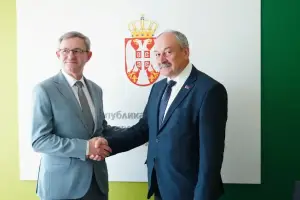 Belgrade, 11 July 2025
Belgrade, 11 July 2025Potential for improving cooperation with Belarus in many areas
-
 Požega, 5 July 2025
Požega, 5 July 2025Section of Pakovraće - Požega highway officially opened
-
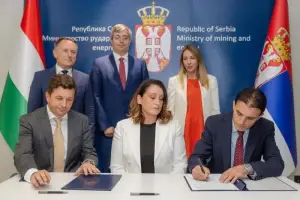 Belgrade, 2 July 2025
Belgrade, 2 July 2025Technical specifications defined for Serbia-Hungary oil pipeline
-
 Belgrade, 30 June 2025
Belgrade, 30 June 2025IMF confirms Serbia successfully implementing all agreed reforms
-
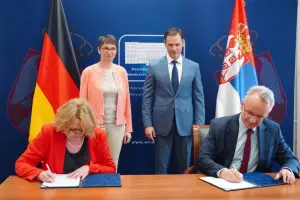 Belgrade, 27 June 2025
Belgrade, 27 June 2025Double Taxation Avoidance Agreement with Germany signed
-
 Kostolac, 25 June 2025
Kostolac, 25 June 2025Construction of Kostolac wind farm nearing completion
-
 Belgrade, 24 June 2025
Belgrade, 24 June 2025Government supports request for new postponement of sanctions against NIS
-
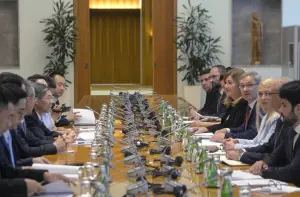 Belgrade, 23 June 2025
Belgrade, 23 June 2025Procedures to facilitate sale of Serbian products to China to be accelerated
-
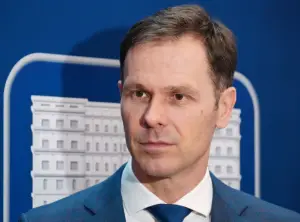 Belgrade, 21 June 2025
Belgrade, 21 June 2025Serbia receives first funds under Growth Plan for the Western Balkans
-
 Belgrade/Cairo, 20 June 2025
Belgrade/Cairo, 20 June 2025New phase in relations with Egypt in field of agriculture
